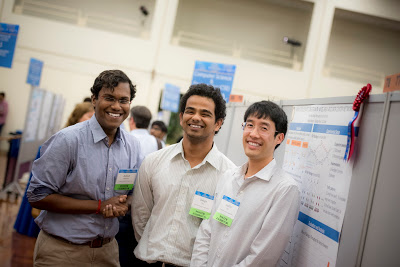
At the annual Jacobs School of Engineering Research Expo, a team of three students advised by CSE Prof. George Porter received the top award out of nearly 30 posters (see story below) presented by graduate students from the Computer Science and Engineering department. The award went to the team of primary researcher Ashish Kashinath, with student collaborators Debjit Roy and Justin Tee, all of them students in CSE (pictured from left to right below; photo by Erik Jepsen/UC San Diego Publications).
Their poster focused on "Fibbing to Alleviate Congestion in WAN and Data Center Networks." The 'fibbing' technique injects fake nodes and links into hybrid networks so that both OpenFlow and legacy routers compute forwarding tables based on augmented topologies. According to Kashinath and his colleagues, their solution to relieving congestion in data centers and wide-area networks (WANs) is a hybrid, centralized software-defined networking (SDN)/distributed approach that leverages fibbing. "Fibbing can be a readily deployable and effective solution to congestion relief," noted Kashinath, adding that in simulating congestion, the researchers that fibbing increased throughput of flows compared to ordinary TCP (or even ECN-enabled TCP). The poster also spelled out a routing table with metrics for times when congestion-triggered fibbing can be most effective. In the abstract accompanying their poster, Kashinath, Roy and Tee concluded that the "fibbing technique is a viable and effective solution to congestion relief in data centers and WAN that is readily deployable in hybrid networks."
Prof. Porter, the students' advisor, put their award-winning project into the broader perspective. "Networks are undergoing a fundamental transformation to become significantly more programmable, letting operators and even users tailor the network to organizational needs," said Porter. "In this poster, Tee, Roy, and Kashinath explore the applicability of providing artificial input signals to network switches and routers to cause them to react to traffic in non-standard ways, yet end up providing better performance compared to their in-built programming. What is exciting about their work is that they demonstrate the applicability of this technique to both globe-spanning wide-area networks, as well as single-building data centers which underpin massive sites like Google, Facebook, and Amazon."
Research Expo is an annual showcase of top graduate research projects in the Jacobs School at UC San Diego. During the poster session, grad students are judged on the quality of their work and how well they articulate the significance of their research to society. Judges from industry, who often are alumni, pick the winners for each department. A group of faculty judges picked the overall winner from the six department winners (this year, awarding that honor to NanoEngineering Ph.D. student Timothy O'Connor).

